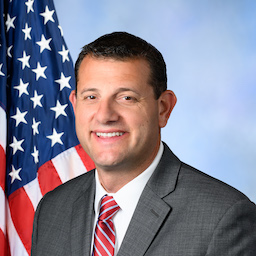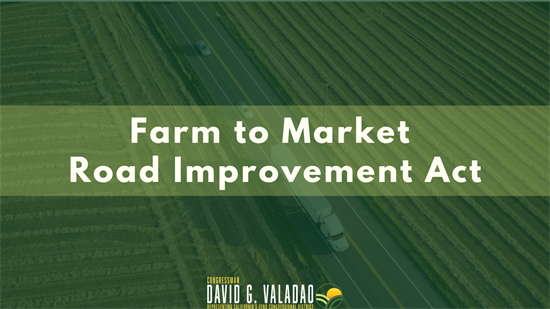- Home
- About
-
Services
- Art Competition
- Community Project Funding Map
- Congressional App Contest
- Congressional Certificate
- Event Request
- Flag Request
- Grants
- Grant Letters of Support
- Help with a Federal Agency
- Inauguration
- Internships
- Kids Page
- Meeting Request
- Service Academy Nominations
- Tour Requests
- Vietnam Veteran Commemoration
- Government Shutdown FAQ
- Issues
- Media
- Contact

Press Releases
Congressman Valadao Introduces Legislation to Fix Central Valley Roads
Washington,
September 10, 2024
|
Faith Mabry
Today, Congressman David G. Valadao (CA-22) and Congresswoman Sheila Cherfilus-McCormick (FL-20) introduced the Farm to Market Road Improvement Act.
WASHINGTON – Today, Congressman David G. Valadao (CA-22) and Congresswoman Sheila Cherfilus-McCormick (FL-20) introduced the Farm to Market Road Improvement Act. Roads in dense agricultural areas are traveled often by heavy trucks carrying up to 80,000 pounds of agricultural freight. This type of use has a disproportionate impact on local road and bridge infrastructure in these areas, which leads to costly repairs for local governments. This legislation aims to make additional federal resources available to fix the roads that play a critical role in America’s food supply chain. Reps. Valadao and Cherfilus-McCormick are joined by Congressmen Fong and Costa in introducing this legislation. “The Central Valley plays a critical role in the security of our nation’s food supply,” said Congressman Valadao. “But after years of wear and tear from heavy trucks transporting the food that feeds the world through our roads, many are in desperate need of repair. This bill would make counties throughout the Central Valley eligible for additional federal resources to fix roads that are critical to our food supply chain. I’m proud to introduce this bipartisan legislation to improve local infrastructure and support jobs throughout our community.” “Ensuring the integrity of our roads is crucial for the economy and well-being of communities in the Glades, where agriculture remains a vital industry," said Congresswoman Cherfilus-McCormick. "By investing in the infrastructure that supports our local farmers, we are not only securing the safe transport of their goods but also strengthening the supply chain that feeds our nation. This bill exemplifies the kind of bipartisan effort needed to protect our agricultural backbone and create sustainable growth in our communities.” Reps. Valadao and Cherfilus-McCormick were joined in introduction by Reps. Vince Fong (CA-20) and Jim Costa (CA-21). “In the Central Valley, we see firsthand the necessity of roads to distribute fresh food throughout our transportation infrastructure,” said Congressman Fong. “These vital roads must be prioritized for constant upkeep to not only move farming and ranching goods, but also to help our neighbors trying to get to work and their children to school safely every day. This act will ensure that our roads are maintained, and our agriculture industry is supported so Central Valley’s agriculture can continue to supply food to our nation.” “Farm to market roads are critical for our rural communities as they are able to effectively and efficiently transport our agricultural goods to market. The Farm to Market Road Improvement Act will unlock additional federal resources to ensure agricultural goods grown locally in the San Joaquin Valley can go from farm to market so our Valley can continue to feed the nation and world,” said Congressman Costa. The Farm to Market Road Improvement Act is supported by Tulare County Association of Governments, Kings County, California Farm Bureau, American Farm Bureau, and Palm Beach County. “Congressman Valadao’s bill will significantly increase federal funding availability to rural counties, like Tulare County, which are home to an exceptionally diverse and productive agricultural region. This proposal will improve traffic safety and help deliver Tulare County’s' agricultural products to markets across the world. We are grateful to Congressman Valadao for always keeping the Valley at the forefront of his efforts in Congress, and look forward to working with him to get this bill to the President’s desk,” said Tulare County Association of Governments Chairman Rudy Mendoza Background: The Farm to Market Road Improvement Act would create a 10 percent set aside in the Rural Surface Transportation Grant Program for farm to market roads. Farm to market roads would be defined by this legislation as roads within a county that have an annual gross ag production value of at least $1 billion and ag production of at least $500,000 per square mile. Fresno, Tulare, Kings, and Kern Counties all qualify under these criteria. The DOT and USDA would be required to create, and annually update, a list of covered counties. Read the full text of the bill here.
|

